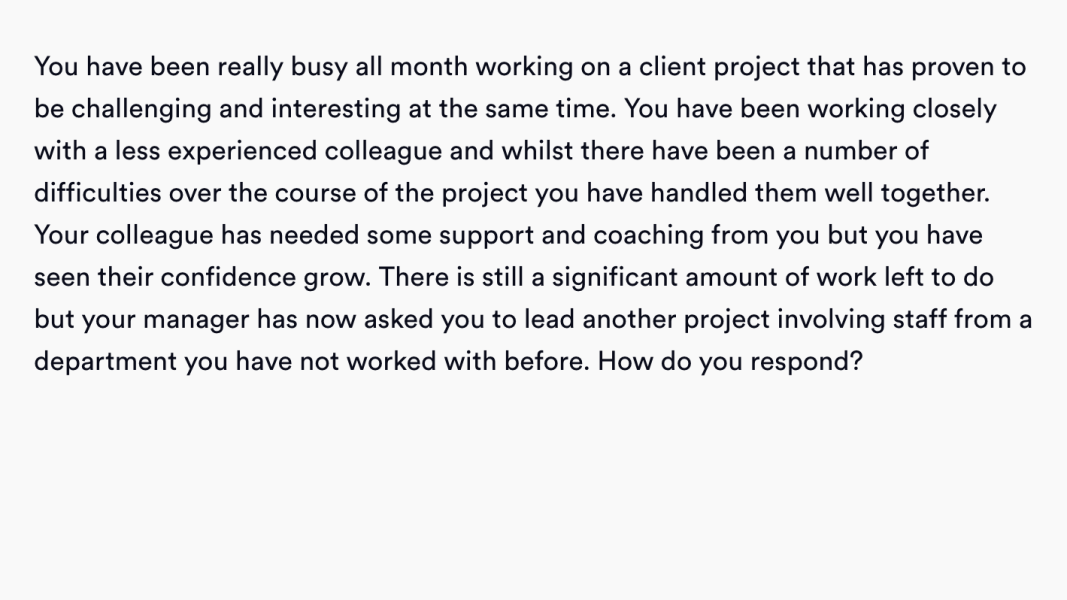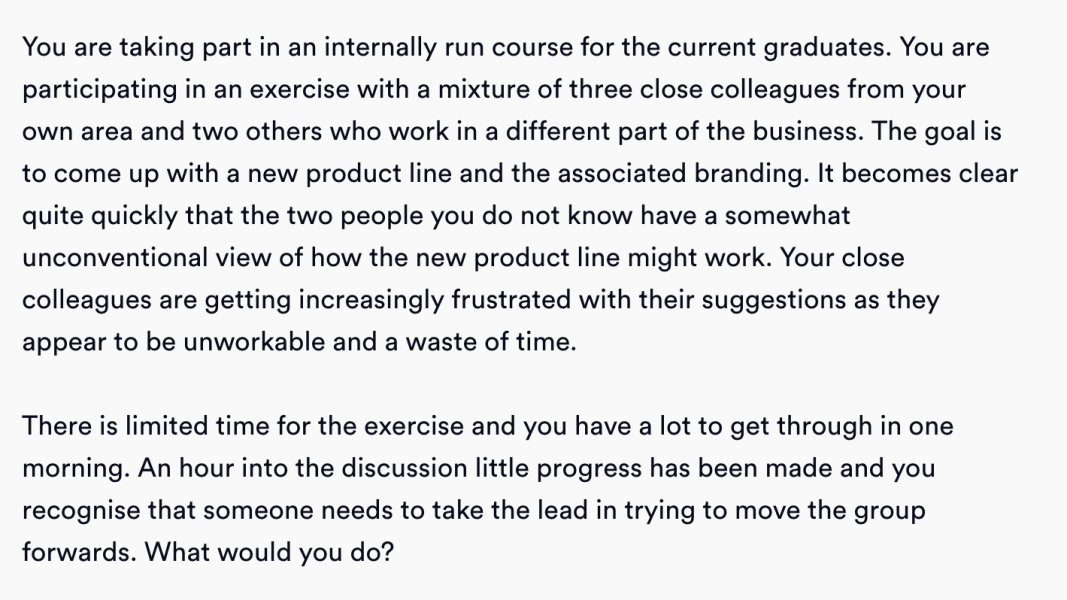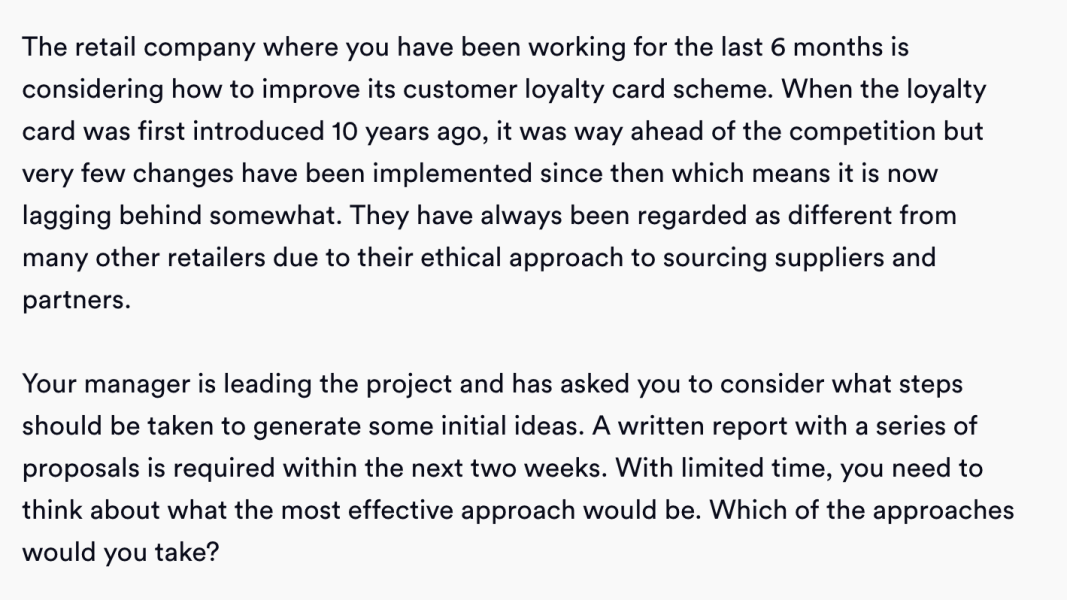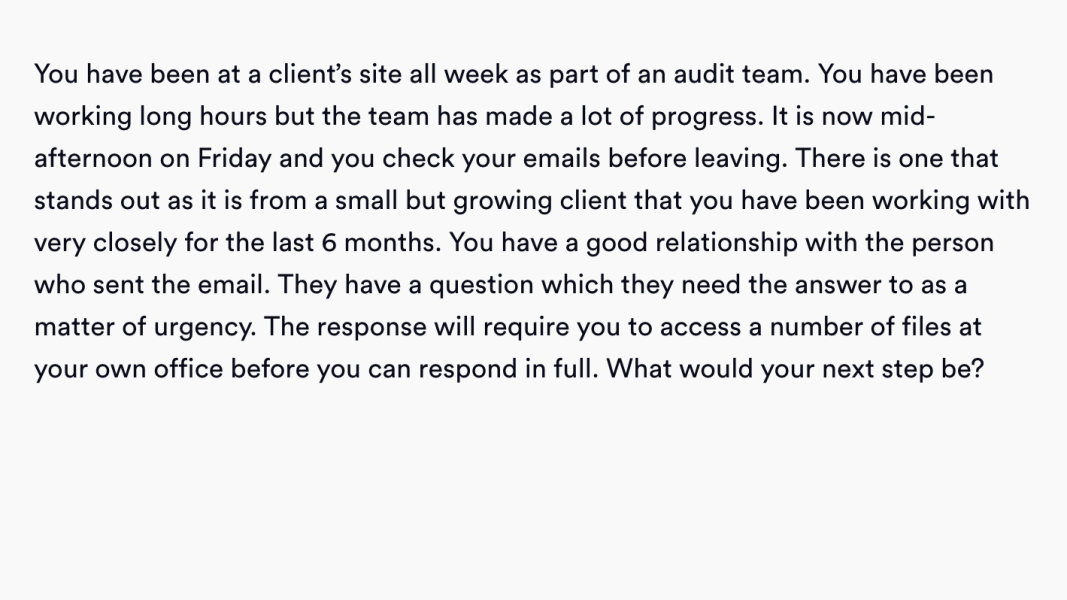Free situational judgement test questions with explanations
When practicing situational judgement tests, you should seek to experience a variety of question types that address key competencies – communication, teamwork and decision-making skills, for example.
It’s also a good idea to understand customer service and client-facing scenarios, even if the role is not a direct sales role.
As you practice, note down which types of questions are tripping you up and use our practice situational judgement test questions to get quicker at spotting the best answers.
Solutions to each are below the questions.
Example question: communication

Read the passage and select how you would most likely and least likely respond:
A) Be honest with your manager, outlining that your current project and your colleague will continue to need your input until the end of the first project. Explain that you don’t want to desert them and see the project fail.
B) Accept the second project and explain to your manager that you will work extra hours and weekends to ensure that you can dedicate sufficient time to both projects for the immediate term. This will ensure that your less experienced colleague is not abandoned but that you can still take on the new project.
C) Tell your manager that you would love to take on the second project and make assurances that you will successfully deliver both by giving your colleague on the first project more autonomy but will continue to regularly meet with them and be on hand for issues as they arise.
D) Agree to take on the second project but set up daily calls with your less experienced colleague who is working on the first project to ensure that they remain on track and that you know everything that is happening. That way you can continue to oversee the first project as well as managing the second one.
Example question: teamwork

Read the passage and select how you would most likely and least likely respond:
A) Tactfully suggest the group should focus on the suggestions that are more in keeping with the current product lines. This will give the group more focus and will get them moving on to the next stage more effectively.
B) Suggest that as a group you create a series of criteria against which to review all of the suggestions made so far. This will ensure that all suggestions get a fair hearing.
C) Suggest that the group splits into three so that each pair can quickly work up a project plan for their favoured suggestion. Encourage your less conventional team members a chance to work up a plan that they can share with the rest of the group to demonstrate a way of making their ideas work.
D) Ask each member of the group which of the suggested product lines they think will be more successful and why. Offer to act as secretary and record all opinions. Once everyone has put their point forward, encourage a debate that focuses on coming to agreement based on the pros and cons of the solutions offered.
Example question: decision-making skills

Read the passage and select how you would most likely and least likely respond:
A) Arrange a kick off meeting with your manager to brainstorm ideas based on their prior experience in retail and your observations of the business since joining.
B) Start by conducting desk based research to look at what the competition is doing and learning from that.
C) Set up a series of focus groups to include customers from a diverse range of backgrounds to try and understand what they are looking for from the loyalty card.
D) Meet with the finance and marketing teams and chair a session to generate ideas from them on what would generate the most financial gains in their view.
Example question: customer service

Read the passage and select how you would most likely and least likely respond:
A) Respond to the email as best you can before leaving without having access to the key files and tell the client that you will double check everything first thing on Monday.
B) Call the client immediately to find out exactly when they need the information by. If they do need it this evening you can pop back to the office and talk them through the key information and then provide a more in-depth written response on Monday.
C) Reply immediately telling the client that you need to get more information for them before you can give them an answer in full and with that in mind you will get back to them first thing on Monday morning as a priority.
D) Leave the email for now and deal with it first thing on Monday morning. The client will have received your out of office response anyway and may have contacted a colleague already.
Answers
Communication
C) is the most likely. This response shows that you are enthusiastic about extra responsibilities and that you have thought of ways to ensure both projects can successfully be delivered. You are demonstrating that you can empower and support your colleague without having to get involved in all of the day to day delivery issues.
A) is the least likely. Your manager is demonstrating trust in you by offering you the opportunity to lead a project within a different department. As a graduate you need to grasp opportunities like this with enthusiasm and find ways to ensure all projects are delivered successfully. By declining their offer you may be missing out on opportunities further down the line.
Teamwork
D) is the most likely. By asking everyone to make a decision about their favoured option and to also back this up with reasoned arguments it is encouraging debate and open communication. Everyone has to listen to everyone else’s views and this will encourage the team to work more cohesively.
A) is the least likely. This approach may well encourage the group to progress to the next stage but it fails to recognise that diverse views can be harnessed to give a real advantage in a team situation. Sometimes it is too easy to stick with what we know rather than capitalising on diversity within a team, even if it takes you outside of your comfort zone.
Decision making
C) is the most likely. This approach ensures that your initial proposal will take account of what customers would like to see. By taking steps to understand your customers you can tailor your proposals to ensure their needs are met.
A) is the least likely. Your manager has asked you come up with some proposed changes. This approach merely brings the problem back to them. Further, it is a very inward facing approach and takes no account of the competitive landscape and more importantly, what customers would like to see.
Customer service
B) is the most likely. By calling the client you are ensuring that you are respond according to their needs. It may be that they can wait for the information but it is important to establish this. It recognises that even a simple verbal response must be correct and having access to the correct files is vital. As they are your client it is important that you demonstrate you are willing to go the extra mile.
D) is the least likely. This is a client you have been working with very closely for 6 months so it is you they need help from. By ignoring the email completely it is evident that you are not prepared to go the extra mile. You have a good relationship with them so simply ignoring them is not what they will expect from you.
What competencies do situational judgement tests typically test?
Examples of core competencies tested by situational judgement tests include (but are not limited to):
Communication skills
SJTs focus on your skill with people: good communication and networking abilities should earn you a few points. But what really constitutes good communication?
In short, this is how you relate to others, and how good you are at adapting the style of a conversation to successfully influence and communicate with people. Behavioural thinking and a good level of empathy are therefore necessary to succeed, as you would be expected to effectively communicate your information in a manner appropriate to the audience, with clarity and purpose.
Team player
You might have been a sports star in your secondary school, but collaboration on a football pitch can be different from the one expected in a work environment. While taking a situational judgement test, remember to show how you can work collaboratively and empathetically within diverse teams.
Being a team member for some employers might also mean that you need to put the needs of the team above your own, and demonstrate openness and honesty with all the members. This is usually achieved by encouraging, listening and supporting others.
Relationship builder
You need to know how to successfully network with your team members. But also how to sustain effective relationships beyond your workplace. This includes relationships with customers, partners, and suppliers, to support the long-term goals of the company.
Customer focus
Customer experience is highly important, and employers know it. To score highly in SJTs, you must demonstrate that you value customers and clients. This means, of course, striving to understand their needs, and being prepared to guarantee them timely and efficient service. And sometimes, going the extra mile to surpass their expectations.
Creative and analytical thinking
Usually, what is meant by this is your ability to think independently with a good balance of realism and pragmatism. As an analytical thinker, you can demonstrate the intellectual capacity to identify and propose solutions, while considering numerous angles. Employers are looking for confident thinkers, who can draw conclusions even when dealing with conflicting or complex data.
Commercial awareness
Commercial awareness, together with market and competitor knowledge, is especially relevant if you are applying for a job in law or finance. Employers are aware that people with such skills are more likely to seize opportunities to grow an organization – and address wider issues that could impact its success.
Achiever attitude
A true achiever personality should possess drive, determination, and resilience. If you have a ‘can-do’ attitude; it means you are responsible for successful delivery of your own tasks, while being ready to work hard and display enthusiasm in all that you do.
Someone who is focused on achieving results knows how to approach work with a sense of urgency, and keeps the end goal in sight at all times.
Planning and organising
Employers want to know that you can deliver high-quality work in an efficient and timely manner. Planning could also mean successfully managing not only your time, but also time of other team members, while ensuring all necessary resources are available as required.
If you are a good planner, it means you are able to create and monitor clear action schedules and you know how to communicate any updates to those plans with all relevant stakeholders.















